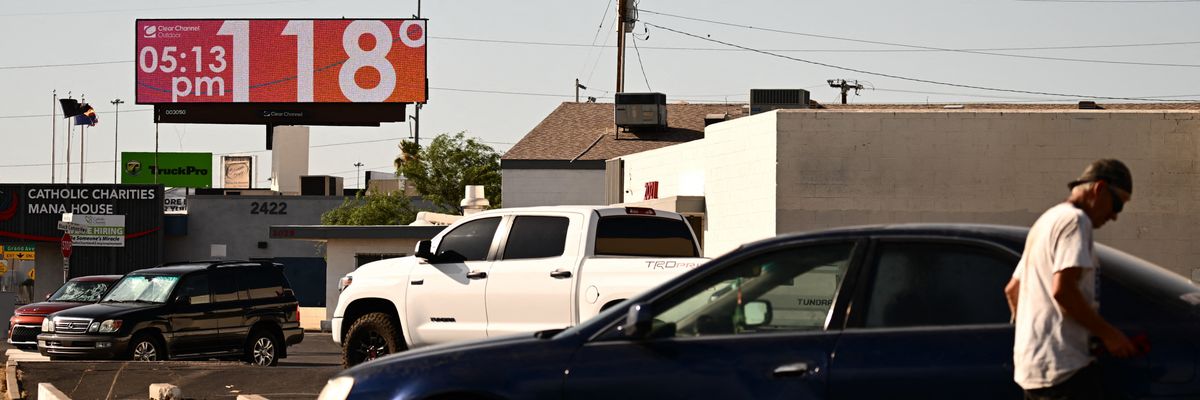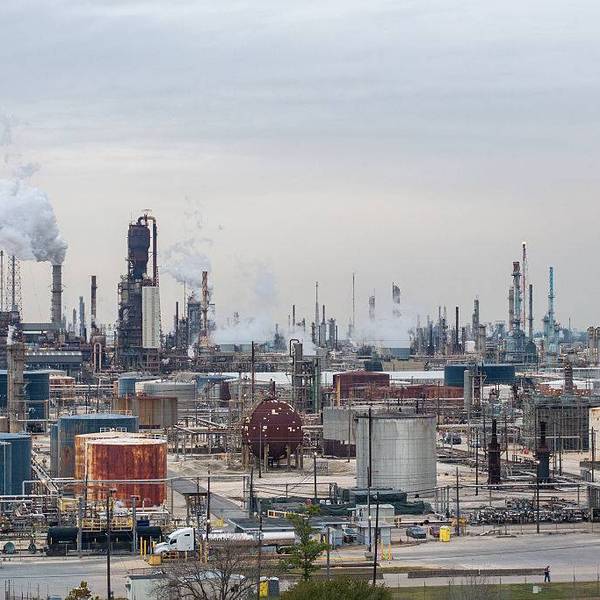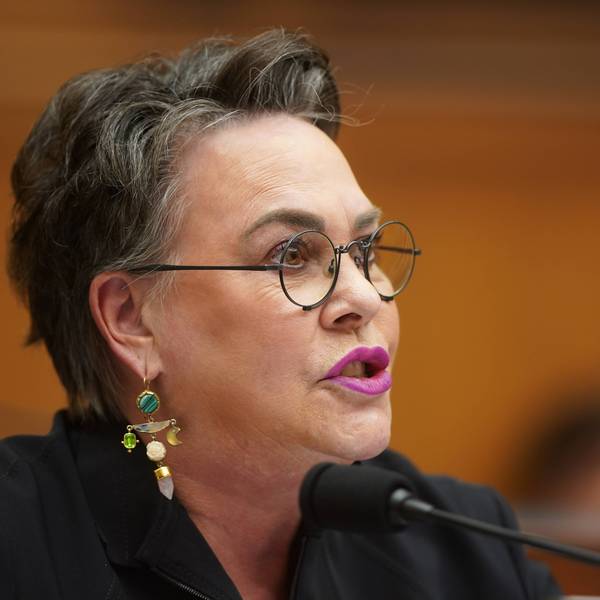
A billboard displays a temperature of 118°F during a record heatwave in Phoenix, Arizona on July 18, 2023.
Woman Files First Climate-Related Wrongful Death Suit Against Fossil Fuel Companies
"These fossil fuel actors should be held accountable to the victims of their lethal conduct, and this wrongful death suit provides a compelling new approach for climate victims moving forward."
Two years after legal scholars wrote in the Harvard Environmental Law Review that fossil fuel companies could feasibly be charged with homicide in cases of people who are killed by climate-fueled extreme weather events, one woman is taking a major step toward holding oil and gas giants accountable for a specific death—that of her mother, who died during an extreme heatwave in 2021.
Misti Leon filed a civil lawsuit against Exxon Mobil, Chevron, Shell, BP, ConocoPhillips, Phillips 66, and BP subsidiary Olympic Pipeline Company, arguing that their knowledge going back decades that extracting oil and gas would heat the planet makes them liable for the death of her mother, Juliana.
Juliana Leon, who was 65, was making a 100-mile drive home from a doctor's appointment in Seattle on June 28, 2021 when she pulled over and rolled down her car windows. Emergency workers found her hours later having died of hyperthermia, or overheating, with her body temperature having reached 110°F.
A heat dome had settled over the Pacific Northwest, with high pressure trapping hot air over the region, and the World Weather Attribution later found that the heat dome would have been "virtually impossible" without climate change resulting from fossil fuel emissions.
About 600 more people died in Oregon and Washington in late June 2021 than would have been typical for a one-week period, and Leon is arguing that the death of her mother from hyperthermia, or overheating, was the direct result of fossil fuel companies' actions.
Leon is arguing in the case that, as numerous investigations have found, fossil fuel companies have known for decades that extracting oil and gas would cause planet-heating emissions and could result in extreme, potentially deadly weather events like heatwaves, flooding, and wildfires.
"The purpose of criminal law enforcement is to deter future crimes, promote public safety, punish wrongdoers, and encourage the convicted to pursue less harmful practices. All of these public safety goals apply to Big Oil's continuing contributions to climate change."
"Why shouldn't we hold someone legally accountable for this kind of behavior?" David Arkush, director of Public Citizen's Climate Program and a co-author of the Harvard Environmental Law Review paper, told The New York Times. "There would be no question that we would hold them accountable if they caused other types of deaths. This is no different. They foresaw this, they did it anyway, and they hurt people."
Lee Wasserman of the Rockefeller Family Fund called the lawsuit an "important moment for climate accountability."
Although Leon's case is the first, according to legal experts, to attempt to hold fossil fuel giants accountable for a specific death, it is a significant step in a wider effort to bring the industry to justice for its role in causing weather disasters.
Vermont and New York both passed climate superfund laws last year that would allow the states to hold oil companies financially liable for extreme weather events and force them to pay for damages. U.S. Attorney General Pam Bondi has announced lawsuits against the two states over the laws.
In the past decade, dozens of localities and states have also filed lawsuits against oil and gas companies for hiding their knowledge of the impact fossil fuel extraction would have on average global temperatures and the climate.
Aaron Regunberg, accountability project director for Public Citizen's Climate Program, said climate disasters like the one that allegedly killed Juliana Leon "are the foreseeable, and foreseen, consequences of specific actions by fossil fuel corporations, CEOs, and boards of directors."
"They caused the climate crisis and deceived the public about the dangerousness of their products in order to block and delay solutions that could prevent heat deaths like Juliana's," said Regunberg. "These fossil fuel actors should be held accountable to the victims of their lethal conduct, and this wrongful death suit provides a compelling new approach for climate victims moving forward."
"The purpose of criminal law enforcement is to deter future crimes, promote public safety, punish wrongdoers, and encourage the convicted to pursue less harmful practices," he added. "All of these public safety goals apply to Big Oil's continuing contributions to climate change, and prosecutors across the country should take note of this new wrongful death suit and carefully consider how the climate effects their constituents are experiencing fit the criminal laws they are charged with enforcing."
An Urgent Message From Our Co-Founder
Dear Common Dreams reader, The U.S. is on a fast track to authoritarianism like nothing I've ever seen. Meanwhile, corporate news outlets are utterly capitulating to Trump, twisting their coverage to avoid drawing his ire while lining up to stuff cash in his pockets. That's why I believe that Common Dreams is doing the best and most consequential reporting that we've ever done. Our small but mighty team is a progressive reporting powerhouse, covering the news every day that the corporate media never will. Our mission has always been simple: To inform. To inspire. And to ignite change for the common good. Now here's the key piece that I want all our readers to understand: None of this would be possible without your financial support. That's not just some fundraising cliche. It's the absolute and literal truth. We don't accept corporate advertising and never will. We don't have a paywall because we don't think people should be blocked from critical news based on their ability to pay. Everything we do is funded by the donations of readers like you. Will you donate now to help power the nonprofit, independent reporting of Common Dreams? Thank you for being a vital member of our community. Together, we can keep independent journalism alive when it’s needed most. - Craig Brown, Co-founder |
Two years after legal scholars wrote in the Harvard Environmental Law Review that fossil fuel companies could feasibly be charged with homicide in cases of people who are killed by climate-fueled extreme weather events, one woman is taking a major step toward holding oil and gas giants accountable for a specific death—that of her mother, who died during an extreme heatwave in 2021.
Misti Leon filed a civil lawsuit against Exxon Mobil, Chevron, Shell, BP, ConocoPhillips, Phillips 66, and BP subsidiary Olympic Pipeline Company, arguing that their knowledge going back decades that extracting oil and gas would heat the planet makes them liable for the death of her mother, Juliana.
Juliana Leon, who was 65, was making a 100-mile drive home from a doctor's appointment in Seattle on June 28, 2021 when she pulled over and rolled down her car windows. Emergency workers found her hours later having died of hyperthermia, or overheating, with her body temperature having reached 110°F.
A heat dome had settled over the Pacific Northwest, with high pressure trapping hot air over the region, and the World Weather Attribution later found that the heat dome would have been "virtually impossible" without climate change resulting from fossil fuel emissions.
About 600 more people died in Oregon and Washington in late June 2021 than would have been typical for a one-week period, and Leon is arguing that the death of her mother from hyperthermia, or overheating, was the direct result of fossil fuel companies' actions.
Leon is arguing in the case that, as numerous investigations have found, fossil fuel companies have known for decades that extracting oil and gas would cause planet-heating emissions and could result in extreme, potentially deadly weather events like heatwaves, flooding, and wildfires.
"The purpose of criminal law enforcement is to deter future crimes, promote public safety, punish wrongdoers, and encourage the convicted to pursue less harmful practices. All of these public safety goals apply to Big Oil's continuing contributions to climate change."
"Why shouldn't we hold someone legally accountable for this kind of behavior?" David Arkush, director of Public Citizen's Climate Program and a co-author of the Harvard Environmental Law Review paper, told The New York Times. "There would be no question that we would hold them accountable if they caused other types of deaths. This is no different. They foresaw this, they did it anyway, and they hurt people."
Lee Wasserman of the Rockefeller Family Fund called the lawsuit an "important moment for climate accountability."
Although Leon's case is the first, according to legal experts, to attempt to hold fossil fuel giants accountable for a specific death, it is a significant step in a wider effort to bring the industry to justice for its role in causing weather disasters.
Vermont and New York both passed climate superfund laws last year that would allow the states to hold oil companies financially liable for extreme weather events and force them to pay for damages. U.S. Attorney General Pam Bondi has announced lawsuits against the two states over the laws.
In the past decade, dozens of localities and states have also filed lawsuits against oil and gas companies for hiding their knowledge of the impact fossil fuel extraction would have on average global temperatures and the climate.
Aaron Regunberg, accountability project director for Public Citizen's Climate Program, said climate disasters like the one that allegedly killed Juliana Leon "are the foreseeable, and foreseen, consequences of specific actions by fossil fuel corporations, CEOs, and boards of directors."
"They caused the climate crisis and deceived the public about the dangerousness of their products in order to block and delay solutions that could prevent heat deaths like Juliana's," said Regunberg. "These fossil fuel actors should be held accountable to the victims of their lethal conduct, and this wrongful death suit provides a compelling new approach for climate victims moving forward."
"The purpose of criminal law enforcement is to deter future crimes, promote public safety, punish wrongdoers, and encourage the convicted to pursue less harmful practices," he added. "All of these public safety goals apply to Big Oil's continuing contributions to climate change, and prosecutors across the country should take note of this new wrongful death suit and carefully consider how the climate effects their constituents are experiencing fit the criminal laws they are charged with enforcing."
- Amid Maui Fire Devastation, Big Oil Tries to Kill Hawaii Climate Lawsuit ›
- 'We Won't Be Silenced,' Says Greenpeace as Big Oil Threatens Libel Suit ›
- Vermont Sued for New Law Requiring Big Oil to Pay for Climate Damage ›
- 'Time to Make Polluters Pay': Study Ties Fossil Fuel Pollution Directly to Deadly Heatwaves | Common Dreams ›
- 'Groundbreaking': Michigan Sues Big Oil 'Cartel' for Conspiracy to Block Renewable Energy | Common Dreams ›
Two years after legal scholars wrote in the Harvard Environmental Law Review that fossil fuel companies could feasibly be charged with homicide in cases of people who are killed by climate-fueled extreme weather events, one woman is taking a major step toward holding oil and gas giants accountable for a specific death—that of her mother, who died during an extreme heatwave in 2021.
Misti Leon filed a civil lawsuit against Exxon Mobil, Chevron, Shell, BP, ConocoPhillips, Phillips 66, and BP subsidiary Olympic Pipeline Company, arguing that their knowledge going back decades that extracting oil and gas would heat the planet makes them liable for the death of her mother, Juliana.
Juliana Leon, who was 65, was making a 100-mile drive home from a doctor's appointment in Seattle on June 28, 2021 when she pulled over and rolled down her car windows. Emergency workers found her hours later having died of hyperthermia, or overheating, with her body temperature having reached 110°F.
A heat dome had settled over the Pacific Northwest, with high pressure trapping hot air over the region, and the World Weather Attribution later found that the heat dome would have been "virtually impossible" without climate change resulting from fossil fuel emissions.
About 600 more people died in Oregon and Washington in late June 2021 than would have been typical for a one-week period, and Leon is arguing that the death of her mother from hyperthermia, or overheating, was the direct result of fossil fuel companies' actions.
Leon is arguing in the case that, as numerous investigations have found, fossil fuel companies have known for decades that extracting oil and gas would cause planet-heating emissions and could result in extreme, potentially deadly weather events like heatwaves, flooding, and wildfires.
"The purpose of criminal law enforcement is to deter future crimes, promote public safety, punish wrongdoers, and encourage the convicted to pursue less harmful practices. All of these public safety goals apply to Big Oil's continuing contributions to climate change."
"Why shouldn't we hold someone legally accountable for this kind of behavior?" David Arkush, director of Public Citizen's Climate Program and a co-author of the Harvard Environmental Law Review paper, told The New York Times. "There would be no question that we would hold them accountable if they caused other types of deaths. This is no different. They foresaw this, they did it anyway, and they hurt people."
Lee Wasserman of the Rockefeller Family Fund called the lawsuit an "important moment for climate accountability."
Although Leon's case is the first, according to legal experts, to attempt to hold fossil fuel giants accountable for a specific death, it is a significant step in a wider effort to bring the industry to justice for its role in causing weather disasters.
Vermont and New York both passed climate superfund laws last year that would allow the states to hold oil companies financially liable for extreme weather events and force them to pay for damages. U.S. Attorney General Pam Bondi has announced lawsuits against the two states over the laws.
In the past decade, dozens of localities and states have also filed lawsuits against oil and gas companies for hiding their knowledge of the impact fossil fuel extraction would have on average global temperatures and the climate.
Aaron Regunberg, accountability project director for Public Citizen's Climate Program, said climate disasters like the one that allegedly killed Juliana Leon "are the foreseeable, and foreseen, consequences of specific actions by fossil fuel corporations, CEOs, and boards of directors."
"They caused the climate crisis and deceived the public about the dangerousness of their products in order to block and delay solutions that could prevent heat deaths like Juliana's," said Regunberg. "These fossil fuel actors should be held accountable to the victims of their lethal conduct, and this wrongful death suit provides a compelling new approach for climate victims moving forward."
"The purpose of criminal law enforcement is to deter future crimes, promote public safety, punish wrongdoers, and encourage the convicted to pursue less harmful practices," he added. "All of these public safety goals apply to Big Oil's continuing contributions to climate change, and prosecutors across the country should take note of this new wrongful death suit and carefully consider how the climate effects their constituents are experiencing fit the criminal laws they are charged with enforcing."
- Amid Maui Fire Devastation, Big Oil Tries to Kill Hawaii Climate Lawsuit ›
- 'We Won't Be Silenced,' Says Greenpeace as Big Oil Threatens Libel Suit ›
- Vermont Sued for New Law Requiring Big Oil to Pay for Climate Damage ›
- 'Time to Make Polluters Pay': Study Ties Fossil Fuel Pollution Directly to Deadly Heatwaves | Common Dreams ›
- 'Groundbreaking': Michigan Sues Big Oil 'Cartel' for Conspiracy to Block Renewable Energy | Common Dreams ›

